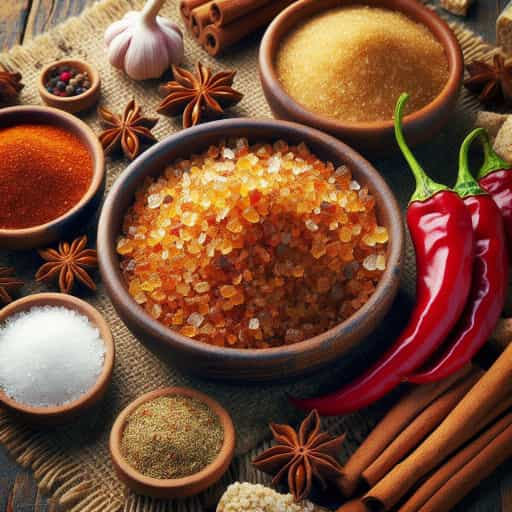BBQ rubs are like the secret handshake of the barbecue world. They’re that magic touch that takes your grilled meat from good to legendary. At its core, a BBQ rub is a blend of spices and seasonings applied to meat before grilling or smoking. This not only infuses the meat with flavour but also helps create that mouthwatering crust known as the bark.
There are generally two types of BBQ rubs to get familiar with: dry rubs and wet rubs. Dry rubs are made entirely of powdered spices and herbs and are great for creating a crispy, flavorful exterior. Wet rubs are like dry rubs’ saucier sibling, mixed with liquid ingredients like oil, vinegar, or mustard. Both have their place in the BBQ world and can dramatically impact the taste and texture of your meat.
BBQ rubs have roots that dig deep into culinary traditions worldwide. From the smoky Texas brisket rubs to the spicy jerk rubs from Jamaica, each culture brings its own twist to the table. Understanding this rich history can give you new appreciation and inspiration for your own BBQ adventures.
The importance of BBQ rubs can’t be overstated. They’re the key to achieving that perfect balance of flavours that dance on your tongue. A well-crafted rub enhances the meat’s natural flavours while adding layers of complexity. When done right, it’s the difference between a good BBQ and an unforgettable one.
Key Ingredients in BBQ Rubs: Finding the Perfect Balance
Getting the ingredients just right in a BBQ rub can feel like alchemy. Let’s break down the essentials to help you become a flavour wizard. At the heart of every BBQ rub are the spices and herbs. Paprika, garlic powder, onion powder, and black pepper are staples in most recipes. Each brings its own unique kick to the mix.
Salt and sugar play crucial roles in BBQ rubs too. Salt acts as a flavour enhancer and helps the spices penetrate the meat. Sugar, on the other hand, caramelizes during cooking, giving your BBQ that irresistible crust. Brown sugar is a popular choice, but white sugar, honey powder, or even maple sugar can work wonders.
Ever heard of adding coffee grounds or cocoa powder to a rub? These unusual ingredients might sound odd, but they add depth and a hint of complexity that can surprise your taste buds. Experimenting with these can lead to some pretty amazing results.
Balancing flavours is where things get really interesting. Sweet, salty, spicy, and savory need to harmonize to create a rub that’s a symphony for your palate. Too much of one can overpower the others, so taste and adjust your mix until you find that perfect equilibrium.
There’s some science behind achieving that perfect rub. Understanding how different ingredients interact with heat and meat fibers can take your BBQ game to the next level. Salt, for example, helps break down muscle proteins, making the meat more tender. Similarly, certain spices release their flavors better when heated. A bit of knowledge here can go a long way in mastering the art of BBQ rubs.

How to Make Your Own BBQ Rub: Step-by-Step Guide
Building your own BBQ rub is like crafting a custom-tailored suit for your meat. You get to decide the fit, the style, and the flavour. First up, gather your essential tools: a good set of measuring spoons, a mixing bowl, and an airtight container for storage. These basics will make your rub-making process smooth and efficient.
A solid starting point is a basic BBQ rub recipe. Combine paprika, garlic powder, onion powder, salt, black pepper, and brown sugar in a bowl. This classic mix hits all the right notes and serves as a base that you can tweak to your liking. Want more heat? Toss in some cayenne pepper or chilli powder. Prefer a hint of freshness? Add dried herbs like thyme or rosemary.
Customizing your rub for different meats is key. Pork might benefit from a sweeter, more aromatic blend with cinnamon and ginger, while beef might call for something bolder with mustard powder and smoked paprika. Chicken? Think bright and zesty with lemon zest or coriander. Adjusting your rub based on the meat can elevate the final dish.
Marinating is where rubs really come into play. Apply your rub generously to the meat, rubbing it in thoroughly to ensure even coverage. Let it sit for at least a couple of hours, but overnight is best for deeper flavour penetration. This resting time allows the spices to infuse and work their magic.
Storing your rub properly is essential to maintain its flavour punch. Keep it in an airtight container in a cool, dark place. Properly stored, your rub can last several months, but fresh is always best. Label your containers with the date you made them, so you always know how fresh your mix is.
Top BBQ Rubs to Try: Reviews and Recommendations
Sometimes, buying a ready-made BBQ rub is the way to go, especially when you’re just starting out or need something quick that packs a punch. There are some commercial rubs out there that are definite winners in the BBQ world. Brands like Meat Church, Killer Hogs, and Rub Some Butt have rave reviews for a reason. They’ve perfected their blends to ensure consistent, amazing flavour every time.
When choosing a commercial rub, look at the ingredient list. The fewer fillers and preservatives, the better. Focus on rubs with recognizable spices and minimal artificial ingredients. Taste is subjective, so don’t be afraid to try a few different brands until you find one that suits your palate.
For those who prefer the DIY route, there are some fantastic rub recipes from top chefs that you can try. Aaron Franklin, Pitmaster at Franklin Barbecue, has a famous Texas-style rub that’s simple but supremely effective. His blend of salt, pepper, and paprika is legendary. Another one to try is Myron Mixon’s recipe, which features brown sugar and chili powder for a sweet and spicy kick.
Creating your signature blend is where the fun really begins. Start with a base recipe and tweak it based on your personal preferences. Maybe you love a bit more heat, or you want a more herbal profile. Keep notes on what you add, so when you hit that perfect mix, you can recreate it every time.
Different meats and grilling techniques can pair better with certain rubs. A bold rub might overpower delicate fish, but it’s perfect for a hearty beef brisket. Lighter rubs suit chicken and pork well, adding flavour without overshadowing the meat. Experiment with different pairings, and don’t be afraid to mix cooking techniques like grilling and smoking to see how they affect the overall flavour.
